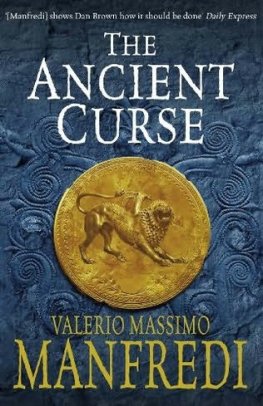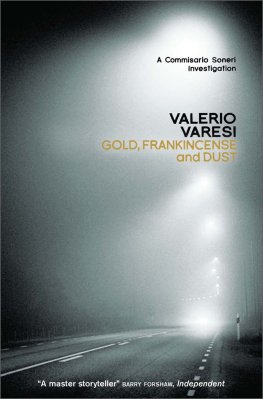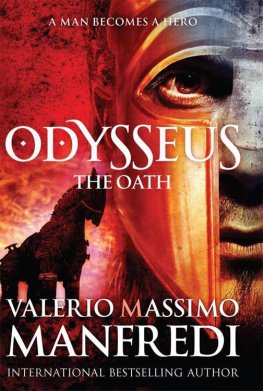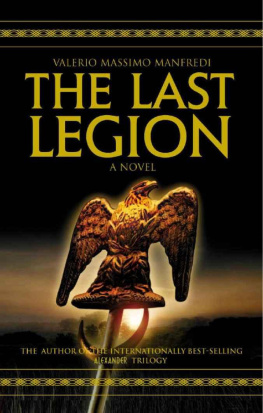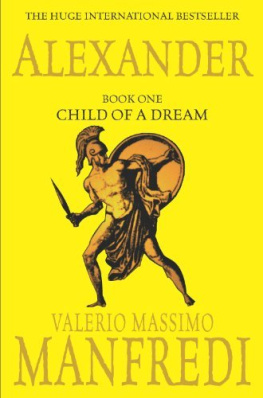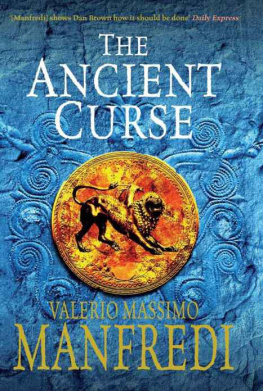Valerio Manfredi - Heroes
Here you can read online Valerio Manfredi - Heroes full text of the book (entire story) in english for free. Download pdf and epub, get meaning, cover and reviews about this ebook. genre: Adventure. Description of the work, (preface) as well as reviews are available. Best literature library LitArk.com created for fans of good reading and offers a wide selection of genres:
Romance novel
Science fiction
Adventure
Detective
Science
History
Home and family
Prose
Art
Politics
Computer
Non-fiction
Religion
Business
Children
Humor
Choose a favorite category and find really read worthwhile books. Enjoy immersion in the world of imagination, feel the emotions of the characters or learn something new for yourself, make an fascinating discovery.

- Book:Heroes
- Author:
- Genre:
- Rating:4 / 5
- Favourites:Add to favourites
- Your mark:
- 80
- 1
- 2
- 3
- 4
- 5
Heroes: summary, description and annotation
We offer to read an annotation, description, summary or preface (depends on what the author of the book "Heroes" wrote himself). If you haven't found the necessary information about the book — write in the comments, we will try to find it.
Heroes — read online for free the complete book (whole text) full work
Below is the text of the book, divided by pages. System saving the place of the last page read, allows you to conveniently read the book "Heroes" online for free, without having to search again every time where you left off. Put a bookmark, and you can go to the page where you finished reading at any time.
Font size:
Interval:
Bookmark:
Valerio Massimo Manfredi
Heroes
1
Silence fell over the room. Everyone was watching the guest, the castaway tossed up by the sea between the rocks and the sand. His hands were still bruised and scratched, his eyes red and his hair as dry as the grass at the end of the summer. But his voice was beautiful, deep and resonant and, as he told his story, his face was transfigured. His eyes shone with a mysterious fever, reflecting the hidden fire within him, burning brighter than the flames licking the hearth.
We understood his language because we lived near the land of the Achaeans and we had once had commercial dealings with them. I myself am a singer of tales among my people and I know wonderful stories, stories so long they take up a whole winters night, when men lend an ear and linger over their wine, but I had never heard such a beautiful and terrible tale in all my life. It was the story of the end of an era, the story of the decline of the heroes. .
Sad, it was, especially for a singer like me, because when the heroes disappear, the poets die as well, without a world to sing of.
I am an old man now and I have no desire to live any longer. I have seen flourishing cities devoured by flames and reduced to ashes, I have seen ferocious pirates roam the seas and sack the coasts, I have seen unspoiled maidens raped by bloody barbarians. I have seen all those that I love die, one by one. Yet, from those far away days of my youth, no memory is more vivid in me than the story of that stranger.
He had witnessed the most famous enterprise ever attempted. The taking of the mightiest city of all Asia! He had fought alongside one of the most powerful men of the earth, an indomitable and generous warrior who had dared to challenge the gods themselves, wounding the hand of Aphrodite and slashing open the belly of Ares, god of war, dark and unforgiving fury who never forsook revenge.
Now you will listen to my story, sitting here on the hay and drinking goats milk, and perhaps you will not believe my words. I know, youll think that these are just tales that Ive spun to entertain my audience, to gain me food and lodging. You are wrong. Before this uncultured, miserable era, a time existed when men lived in cities of stone, dressed in fine linens, drank inebriating wine in goblets of gold and silver, navigated on agile ships to the ends of the earth, battled on chariots of bronze with shining weapons in their grasp. In those times, poets were welcomed into the palaces of kings and princes. They were honoured as gods.
Everything I am about to tell you is true.
Our foreign guest stayed at the palace for several months until one day, at the end of the winter, he disappeared without a word and we never heard of him again. But I hadnt missed a word of the tales he would tell in the evening, after dinner, in the assembly room. The echo of the great war fought on the shores of Asia had reached us, but that was the first time we had ever had the opportunity to listen to the words of a man who had taken part in it.
The chief of our people and the nobles would ask him time and again to tell the story of the war, but he always refused. Too bitter a memory, he said. When he finally did begin to tell his story, he began with the night of the fall of Ilium, the city of Priam, which we know as Troy.
And so, I will now tell you the story of what befell the city as I heard it from his lips. You shall learn how such a long and oppressive war was fought for nothing.
Yes, before he disappeared the stranger revealed a secret to me: the true reason why Ilium was razed to the ground and her people destroyed. No. . it wasnt about a woman. It wasnt over Helen. I should say, instead, that she was one of the combatants, perhaps the most fearsome of them all. Why else would Menelaus have taken her back without making her pay for her betrayal? Some say that the sight of her naked breasts made the sword fall from his hand. No, the reason was another: a reason powerful enough to compel a king to put his queen into the bed of another man. . for years. Unless what I was told is yet another imperfect truth, concealing an enigma within an enigma.
Anyway, that stranger, cast up by the sea on to our shores, had wanted to reveal it to me, a mere boy. In part he told me what he had seen in person, in part what he had heard and in part, I believe, what the gods themselves had inspired in him.
Perhaps he thought that no one would have believed me, or perhaps he needed to free his heart from a weight he could no longer bear.
Here is what he told me. Muse, inspire my story and sustain my memory. You are about to hear such a story as you have never heard, and you will pass it on to your children and to your childrens children.
For seven days and seven nights burned the city of Ilium. The proud citadel burned and the fifty rooms of the royal palace burned, while her inhabitants, those who had survived the massacre, were massed together in the fields like sheep in a pen. There they waited to be assigned to the victors as spoils of the war. The women lay on the ground with their gowns torn and their hair loosed, their eyes cried dry. Almost all of them were the brides or daughters of Trojan warriors who had fallen during the night of the betrayal. They were destined to serve the wives of the victors or to be called as concubines to their beds, to be possessed and profaned, deprived of everything but the bitterness of their memories.
The children cried, dirty and hungry. They lay on the ground until sleep overcame them and when they awoke they cried again.
The Achaean chiefs assembled in the tent of Agamemnon, their high commander, king of Mycenae. They were discussing whether they should leave immediately or whether the army should remain to offer sacrifice in expiation for all the innocent blood spilled. The victory they had awaited for so many years had not brought them the joy they would have expected. Spoils were scarce because the exhausted city had long consumed all of its riches. The atrocities committed the night the city was taken had left in the heart of each one of them the dark expectation of inevitable punishment. They felt like drunks who had reawakened after a night of revelry, with their clothes soiled and the taste of vomit still in their mouths.
They sat in a circle on seats covered with skins. First came Ulysses, the victor: the inventor of the horse, the machine which had tricked the defenders of Troy. But as the army had poured into the city, he had disappeared, and Eurilocus, his cousin, had taken command of his men, Ithacaeans and Cephallenians from the western islands. He had reappeared at dawn, pale and silent. He, the destroyer of the city, had taken just a small part of the spoils. Strange, really, since he was one of the poorest kings of the coalition, the sovereign of dry and rocky islands. And, what counted the most, the victory had been entirely his doing. No one had argued or sought to know what he had hidden in that meagre booty, so small that it aroused neither the jealousy of the other chiefs nor the envy of his men. And after all, he would be returning to Ithaca with the weapons of Achilles, which alone were worth the price of one hundred bulls.
Ulysses, versatile and cunning! He sat, and listened, keeping his left hand on the hilt of his sword and the right on his sceptre, but he heard nothing of what was said because his labyrinthine mind was following paths hidden to all.
Next to him was the seat, empty, of Ajax Telamon. Great Ajax with his sevenfold shield, his immense size a bulwark on both battlefield and ship. The only one of them who had never received help from one of the gods in battle. He had died in shame and grief, throwing himself upon his own sword because Ulysses had denied him the inheritance most sought after: the weapons of Achilles. His father, who day after day trained his gaze out over the waves pounding the rocks of his island, would wait for him in vain.
Font size:
Interval:
Bookmark:
Similar books «Heroes»
Look at similar books to Heroes. We have selected literature similar in name and meaning in the hope of providing readers with more options to find new, interesting, not yet read works.
Discussion, reviews of the book Heroes and just readers' own opinions. Leave your comments, write what you think about the work, its meaning or the main characters. Specify what exactly you liked and what you didn't like, and why you think so.

